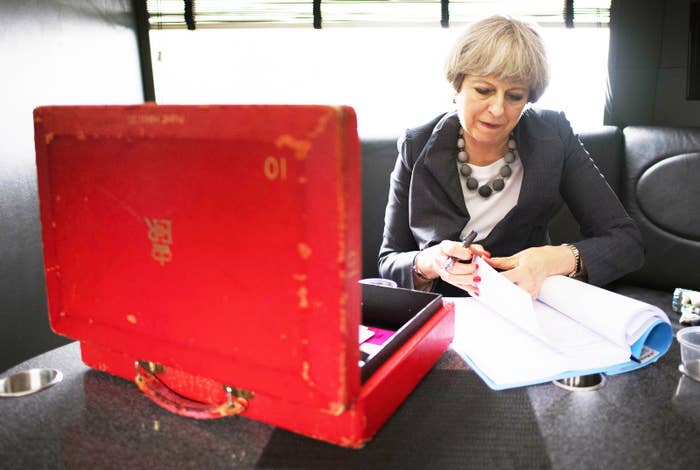
Theresa May has threatened to tear up human rights laws if they get in the way of stopping Islamist extremism.
Speaking at a Conservative rally in Slough on Tuesday night, with the election campaign entering its final hours, the prime minister sought to head off increasing questions about the government's record on national security in the wake of the London Bridge terror attack.
May said she will introduce tougher anti-terrorism measures if she wins the general election on Thursday, including restricting the movement of suspects when the authorities do not have enough evidence to prosecute them.
The prime minister also vowed to make it easier, if she is re-elected, to deport foreign terror suspects to their home countries and introduce longer sentences for those convicted of terror offences.
“And if human rights laws get in the way of doing these things, we will change those laws to make sure we can do them,” the prime minister told a rally of Tory activists.
May did not give specific details of the human rights laws that could conflict, but the ambition might clash with the European Convention on Human Rights, an international treaty to which Britain is a signatory.
The Conservative manifesto states the UK will remain a signatory to the ECHR “for the duration of the next parliament”, even though some in the party believe it has made it harder for UK law enforcement authorities to keep the country safe.
But it could be possible to “derogate”, or opt out of, certain aspects of the ECHR if it conflicts with the tougher measures May wants to take, the government believes.
Repeating comments made in a speech on Sunday, hours after the London Bridge attack, that “enough is enough”, May said the authorities “need to do much more” to take on the rapidly evolving threat of Islamist extremists.

“We need to make sure that the police and security and intelligence agencies have the powers they need,” May told the campaign rally.
The restrictions on terror suspects’ movement could include curfews, stopping them from associating with certain people, or limiting their ability to communicate.
She stopped short of saying the government was considering reintroducing control orders, the controversial legal powers introduced by Labour that allowed the authorities to impose broad restrictions on suspects who couldn’t be deported or charged. Control orders were scrapped by the Conservatives in 2010 and replaced by Terrorism Prevention and Investigation Measures (TPIMs), which were less restrictive.
May's speech came at the end of a long day of campaigning in which she faced difficult questions about the government’s record on security in the aftermath of the London Bridge attack.
After she was challenged repeatedly on Monday about cuts to community policing, the prime minister’s campaign schedule on Tuesday was overshadowed by difficult questions about whether the Home Office, police and intelligence agencies had missed things in the run-up to the Manchester and London killings.
Tuesday began with headlines in the tabloid newspapers asking how one of the London Bridge attackers, Khuram Shazad Butt, had carried out the atrocity when he was known to the authorities — and had appeared in a Channel 4 documentary, The Jihadis Next Door, about British jihadis.
“Why didn’t they stop TV jihadi?” asked the front page of The Sun. It was not the sort of headline a prime minister whose campaign is trying to project an air of competence and authority based on a long track record in the Home Office would have expected two days before an election.
Boris Johnson, the foreign secretary, said in an interview that MI5 and the Metropolitan police have questions to answer about how Butt seemingly slipped through the net.
Speaking to a rally in Stoke on Tuesday afternoon, May said the authorities are facing a changing and increasingly diverse threat, and had stopped several attacks in the last few months.
With the campaign in its final phase, May spent all day in her blue battlebus on Tuesday, starting the morning at a bakery in Fleetwood, in the North West, and ending in Slough. She visited a farm in north Wales, a science fair in Cheltenham, and did two rallies with Tory activists.
The prime minister seemed upbeat and energetic after a difficult few days, and insisted to journalists that she was enjoying the campaign despite it having been criticised as lacklustre and negative. But while May was keen to talk about Brexit and her vision for a positive future beyond it, the killings on Saturday night meant that subject was overshadowed by questions about security.
May’s campaign has tried to portray her as authoritative and competent on counterterrorism, given her experience in government handling law enforcement and national security matters. It has repeatedly attacked Labour for perceived weakness on those areas, with Diane Abbott, the shadow home secretary, featuring prominently in May’s stump speeches.
Despite that, May has not escaped tough scrutiny after the terror attacks.

